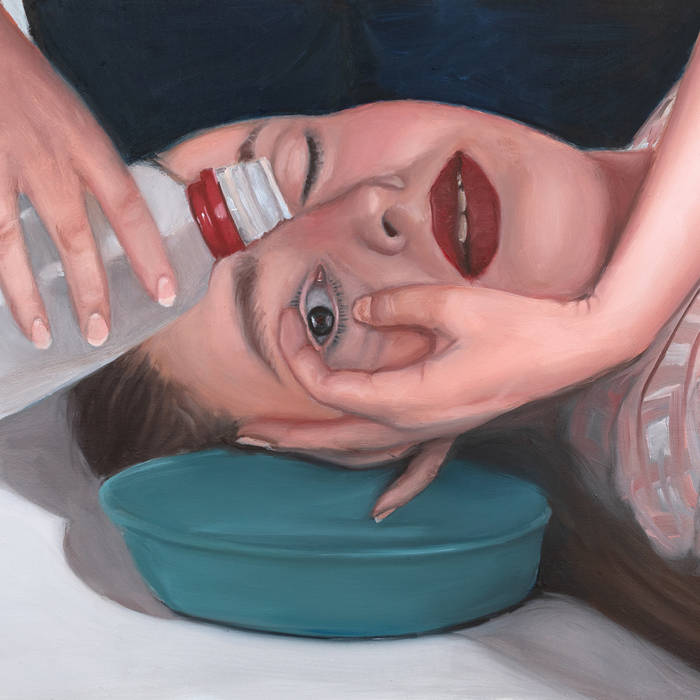Polkadot – …to be crushed | Album Review
/Count Your Lucky Stars
New Year's Eve is always a bittersweet moment for me. I don’t like the dreariness of winter much, and I find the parties fairly boring – instead, I usually spend the lead-up to the special day trapped in that weird mid-holiday liminal slump. More specifically, these past few years, I have spent that time leading up to New Year's Eve just sitting in my car, often in a parking lot with the music low, contemplating how my year went, probably against my best interests. Did I change? Did anyone change? Did something change? Should I change for the new year?
Polkadot’s sophomore album, …to be crushed, asks the same questions and, despite releasing on the precipice of summer, already feels like it's destined to soundtrack that liminal time on the precipice of a new year. Using precise melodies and sharp motifs, each song operates with certainty against looming unpredictability, seemingly invigorated by the challenge to one day move comfortably with the passing of time. As a band largely concerned with feeling weird and trying to find the words for it, this album is full of “tweemo” hooks, fuzz, and group vocals that inch closer toward the answers through profoundly confessional lyricism.
…to be crushed starts on “Left Behind” with just the haunting presence of guitarist/vocalist Daney Espiritu’s words and the distant pluck of a guitar. Espiritu welcomes the listener into the hazy world of the album and lets the rest slowly sharpen into focus. Lyrics about loneliness and self-worth weave together as they are joined by different members of the band, one by one. Together, these instruments mimic the evenness and clarity of the lyrics. It’s a stellar opener that prepares the tone of the rest of the album – contemplative, transparent, and just hopeful enough. It also introduces the collaborative aspect of the redefined band. While Polkadot originally began as Espiritu’s solo project, it has since become a full band effort, opening places to Anton Benedicto on drums, Jordan Jones on bass, and Matthew Estolano on guitar. The first song directly reflects this evolution and, over the course of two and a half minutes, dissolves the barriers around the frustrating aspects of loneliness.
What is Heaven to you? This is a mildly jarring topic Espiritu opens the second song, “New Friends,” with. It’s a vivid and contemplative suggestion that momentarily breaks the distance between musician and listener as we picture our different versions of Heaven. Espiritu describes Heaven with a specific list: karaoke in purple lights, crawling into your arms, playing cards at a bar with friends. This prompt is a scene-setting lyric that encapsulates and encloses themes of the entire album.
“New Friends” is a song that should be, no, needs to be danced to. It has a heartbeat made for grabbing your friend’s hands and jumping around together under a venue’s rotating lights. It demands to be sung along to, face to face, or toward a stage. More than that, it’s sharing sincerity with you. Between the first two tracks, it is abundantly clear that Espiritu is operating with a level of trust between listener and artist, each lyric stitched together with an uncompromising honesty. But suddenly, the contemplation fades away, and the once-danceable melody turns into a thrashy moment to scream to instead of sway to. In “New Friends,” Espiritu sings about specific moments the listener has no reference to and no insight into, but it doesn’t matter; it’s magnetic, and for a fleeting moment, it's yours too.
There is a definitive confidence in Espiritu’s voice, one that suggests that what is being said has been considered and measured, yet an air of reluctance lingers. This makes the words all the more personal. In the bass-heavy “Baby Buzzkill,” Espiritu describes the crushing weight of your own worst thoughts that draw you to stay under your covers, hiding from what might be outside. The disappointment of the lyrics are ultimately drowned out by building distortion and even louder cymbal crashes, leaving the listener with a long buzz of static, which finalizes the emotional thread of the lyrics more effectively than words could.
The album winds through its purple light-lit and fuzzy world before ending on “This Year.” Recalling the singular feeling of the opening track, “This Year” is a song once again started with just a distant strum and clear words; however, this time, it’s engulfed by lingering and almost eerie static – like a guitar left too close to an amp by a band that just left the stage for an encore. As Espiritu’s lyrics seem to reluctantly declare that the time for being jaded is over, a guitar whines ominously from behind, threatening an entrance into the song. A drum’s thud quickly follows as the guitar begins to weave over and under the lyrics. A cacophony is incoming, and it could happen at any time… But it doesn’t. Instead, group vocals enter and soften the blow. Together, the band repeats a single lyric, “This year is coming to an end, I don’t feel any different,” which is punctuated by a repeating kick drum beat. This is a lonesome lyric to end the album on, but the chorus of voices makes it familiar. Loneliness is tangible, yes, but it isn’t singular.
Long after the distortion fades away and the final lyric is sung, New Year’s Eve will come around, and I will once again be in that parking lot, music low, wondering if I changed. Did anyone change? Did something change? Should I change for the new year? But that has to be ignored because, from Polkadot’s perspective, it doesn’t matter. What matters are the fragments of feeling, the pieces of memory, and the persistent hope for something better. Time isn’t linear; a new year is just a new year, and there is always room for more (whatever more may be).
Caro Alt’s (she/her) favorite thing in the world is probably collecting CDs. Caro is from New Orleans, Louisiana and spends her time not sorting her CD collection even though she really, really needs to.






